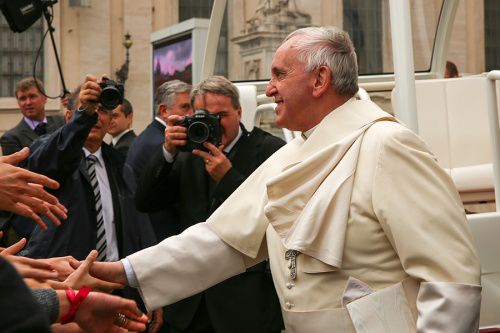As Pope Francis stated in a recent interview that love for the poor is not communism, but the Gospel, one of the interview's co-authors asks if the current economic system is “the best possible,” and encourages a discussion of the question. Andrea Tornielli and Giacomo Galeazzi’s interview with Pope Francis was published at the end of their book “Papa Francesco: questa economia uccide” (‘Pope Francis: this economy kills’), recently released in Italian. Tornielli is encouraging discussion of the issue because, he says, “raising the question does not mean being a communist.” In the interview, Pope Francis is certain that his concern for the poor is not a novelty, but that “it stems from the Gospel and is documented even from the first centuries of Christianity.” “If I repeated some passages from the homilies of the Church Fathers in the second or third century, about how we must treat the poor, some would accuse me of giving a Marxist homily,” Pope Francis stressed. He went on to quote from St. Ambrose and St. John Chrysostom, demonstrating that concern for the poor stretched back to the Church of the first centuries. “As we can see, this concern for the poor is in the Gospel, it is within the tradition of the Church; it is not an invention of communism and it must not be turned into an ideology, as has sometimes happened before in the course of history,” Pope Francis said. The Pope also underscored that “the Church, when it invites us to overcome what I have called ‘the globalization of indifference’, is free from any political interest and any ideology. It is moved only by Jesus' words, and wants to offer its contribution to build a world where we look after one another and care for each other.” Asked if capitalism is an irreversible system, Pope Francis stated that “globalization has helped many people rise out of poverty, but it has also damned many others to starve to death. It is true that global wealth is growing in absolute terms, but inequalities have also grown, and new poverty arisen.” Pope Francis stressed that he noticed “this system sustain itself through a culture of waste,” since “when money, instead of man, is at the center of the system, when money becomes an idol, men and women are reduced to simple instruments of a social and economic system, which is characterized, better yet dominated, by profound inequalities.” Andrea Tornielli, who is the coordinator of La Stampa’s specialized web-site ‘Vatican Insider’ where portions of the interview are published, was attracted by Pope’s words on the culture of waste and idolatry of money, as he explained in an interview with CNA Jan. 11. “Reading the Pope’s speeches, I became aware that there are really pages of the social teaching of the Church, which seem to be a little forgotten, and not very well known by Christians, especially those Christians who are entrusted with policy.” In Tornielli’s view, the reason for this forgetting lies in history. “In previous years, when Soviet communism still existed and the world was divided on two blocs, the focus was on other topics,” he stated. On the other hand, he acknowledged that both St. John Paul II and Benedict XVI have “spoken out very clearly on globalization, poverty, and remedies to poverty.” In his interview, Pope Francis stressed that the culture of waste “leads people to discard babies through abortion. The culture of waste also leads to a hidden euthanasia of older people, who are abandoned, instead of being considered as our memory, our link to our own past, and a source of wisdom for the present. Sometimes I ask myself what the next waste will be. We need to stop before it is too late. Let us stop, please!” Pope Francis also addressed the accusation of being “pauperist,” and he describes pauperism as “a caricature of the Gospel and of poverty itself” — as it was perceived before St. Francis of Assisi came. “St. Francis helped us discover the deep connection between poverty and the way of the Gospel. Jesus states that we cannot serve two masters, God and wealth. Is this pauperism? Jesus tells us what the ‘protocol’ is, on which we will be judged. It is the one we read in chapter 25 of Matthew’s Gospel: I was hungry, I was thirsty, I was in prison, I was sick, I was naked, and you helped me, clothed me, visited me, took care of me,” Pope Francis pointed out. So, the Pope stressed, “whenever we do this to one of our brothers, we do this to Jesus. This is the touchstone. Is it pauperism? No, it is the Gospel.” “Poverty takes us away from idolatry and from feeling self-sufficient. Zacchaeus, after he met Jesus’ merciful gaze, gave half of his fortune away to the poor. The Gospel’s message is for everyone, the Gospel does not condemn the wealthy, but the idolatry of wealth, the idolatry that makes people indifferent to the call of the poor,” said Pope Francis. Andrea Tornielli hoped that “it would be interesting to raise a discussion within and outside the Catholic world, confronting ideas.” Tornielli said: “My question is: the economic system we are living, is it a dogma? Is it the best system possible? I would say no. But saying it, raising the issue, does not mean to be revolutionary, or communists. It simply means to recover a not-well known patrimony, that is, the treasure of the social teaching of the Church, and to see how this may be applied to the world and to contemporary issues.” In Pope Francis’ words, “I would say that we should not consider this state of things as irreversible. Let us not resign ourselves to it. Let us try and build a society and an economy where man and his welfare are at the center, instead of money.”

